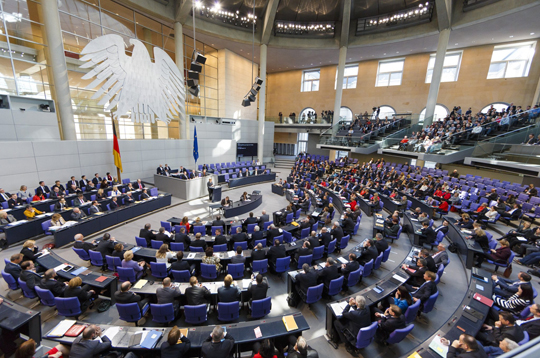Dividends of Solidarity
Freiburg, Nov 02, 2018
The Unconditional Basic Income (UBI) has been widely discussed in Germany for a good ten years now. Yet the debate has been running for far longer and much more intensely in academia. One of the key voices in the debate is Prof. Dr. Karl Justus Bernhard Neumärker. As head of the Department of Economic Policy and Constitutional Economic Theory at the University of Freiburg, together with the Basic Income Research Group and the France Center, he invited researchers from across Europe to a conference in mid-October 2018 on the possibilities for designing an EU-wide UBI. He talked to Dietrich Roeschmann about the necessary conditions, difficulties and opportunities of such a project.

Belgian philosopher Philippe Van Parijs’ concept for a Euro Dividend is that every EU citizen would receive a flat monthly income of 200 euros. Photos: jarma und ProMotion/beide Fotolia
Professor Neumärker, the UBI rouses equally great interest in academic debate and the wider population. Why are politicians much cooler about it?
Karl Justus Bernhard Neumärker: That’s easy: because politicians and many interest groups that profit from the current system have very good reasons for fearing it will lose them some of their power. This equally applies to companies and unions. Many politicians are often unnerved by the UBI because it really is a very radical concept: a flat payment to everyone – in Germany the discussion is currently about 1,000 euros – financed by the simplest tax system possible. Another potential source would be the taxation of automated work, which is increasingly replacing the human workforce. But that would mean the loss of many levers that affect their constituencies, and these are important parameters that politicians use to gain the loyalty of their interest groups.
Many countries have got further than Germany with the discussion of a UBI. A pilot study in Finland is now reaching its final stage, although it is already held to have failed. Why?
The project, which involved 2,000 participants, was originally designed to compare a partial UBI with a total UBI. But the Finnish government had another interest: they wanted to test a remedy for the high systemic unemployment in the country with the partial UBI. Paying out 560 euros a month without any test of need was supposed to encourage unemployed test subjects to look for a job. This didn’t work for many reasons.
Are there other pilot projects that have been more successful?
The entirety of the effects of UBI have never been tested. Until now, as in Finland, only a few aspects have been focused on, or the amount of the basic income per capita was – as for instance in the case of the Alaska Permanent Fund – simply too low.

Karl Justus Bernhard Neumärker would like to test the introduction of an Unconditional Basic Income in the trinational region of the Upper Rhine. Photo: Patrick Seeger
So the success of a UBI would be pure speculation?
No. Robust results from a real field study would be important. On the other hand, researchers such as Dr. Malcolm Torry from the London School of Economics or Dr. Maximilian Sommer from the Catholic University of Eichstätt-Ingolstadt have been working on microsimulations for financing UBI and the foreseeable effects on labor supply, poverty and inequality. You mustn't forget one thing though: the most important jobs market reform of the past decade – Hartz IV – wasn’t tested in advance. However, a long-term field study could probably have observed how employers start to use wage dumping, resulting in the introduction of a minimum wage becoming inevitable in order to provide Hartz IV claimants with social protection. Given this background it is right, although remarkable, that supporters of a UBI are now called on by politicians to undertake such field studies to support their assumptions.
The conference in Freiburg discussed ideas of a cross-border UBI for Europe. What form might this take?
A few years ago, the Belgian philosopher Prof. Dr. Philippe Van Parijs developed the concept of a Euro Dividend. His idea, which he also presented in Freiburg, is this: every EU citizen is paid a flat monthly income of 200 euros.
No one can live on 200 euros.
No, the Euro Dividend isn’t a basic income intended to secure livelihoods, but a sort of unconditional benefit that enables everyone to participate in social life in Europe and as a result should have an integrative effect. If we demand a lot of citizens, we shouldn’t let them feel that they don’t get anything except disadvantages back from the euro and the EU. This is where the Euro Dividend comes in – as a kind of integration benefit with a stabilizing effect: “Because you are involved in this important project and we can rely on you, you will receive 200 euros a month.” This would invigorate or reinvigorate European solidarity.
Who would finance it?
There are various thoughts about this at the moment. It’s conceivable that the Euro Dividend would be paid from a fund generated from the benefits of integration. Philippe van Parijs favors a standard premium on taxes on consumption in every country. Another option would be the EU-wide introduction of a carefully calculated uniform financial transaction tax.

Plenum of the German Bundestag: politicians have so far been cool about the subject of an Unconditional Basic Income – because its introduction would mean that they would lose important levers to ensure the loyalty of their interest groups, says Karl Justus Bernhard Neumärker. Photo: Deutscher Bundestag / Thomas Trutschel/photothek.net
Who would be entitled to the Euro Dividend?
That would have to be properly regulated: who is a citizen of the EU? Is it everyone with an EU passport? Everyone who pays taxes in the EU? Everyone who lives in the EU?
A study by the University of Hamburg on the introduction of the UBI in immigration societies recommends the grading of affiliation. For each year that someone lives in the territory of the UBI, they should receive a ten percent share of the full UBI. Is this conceivable?
Yes, very much so in fact. And that is precisely what fascinates me so much about the current discussion about a UBI. We are having an exceptionally productive debate which consistently gives rise to new, constructive proposals for thorny questions.
You are yourself currently preparing a pilot project for a cross-border UBI, which draws on a different concept to the Euro Dividend. What does it involve?
I would very much like to test the introduction of a UBI in the trinational region of the Upper Rhine. We’re currently engaged in investigating the networks and resources necessary for this. It is important to discover how a UBI can adapt to the different social systems in Germany, France and Switzerland, how it would work inside and outside the EU and whether it would really be regionally possible to finance the UBI by cutting classic welfare benefits. We may also find out what amount of UBI is reasonable and what effects it would have on people’s everyday lives, behavior and sense of time – on the unemployed and the employed, on people in the cities and in the countryside.
Website of the Basic Income Research Group at the University of Freiburg

